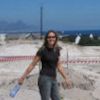
Liz Metcalfe
- Course: Environmental Science BSc
- Company: University of Leeds
Why did you choose Leeds?
I’m originally from a village in Bedfordshire, so I was really excited to experience another part of the country and the trendy city of Leeds was really tempting. Combined with the fact that the University of Leeds is a prestigious university and has dedicated Environmental Science courses, it was unquestionably my first choice.
What were the highlights of your coursework?
The course offered a huge variety - everything from Climate Change to Development Planning to Land Degradation modules, so there was always something interesting to choose from.
What are your abiding memories of Leeds?
I guess, like most students, I remember the social side. Leeds does have a particularly good social scene with a variety of places and events, and I had a fantastically fun and social time to balance the days of hard work. I was part of a small group that set up EnviroSoc and we organised the year-end balls and Christmas fancy dress parties. Happy memories!
What was your particular area of interest?
I was fascinated by the Dryland Environments course and had the great fortune to be able to do my dissertation fieldwork in the Kalahari region of Botswana and Namibia looking at soil crusts as indicators of land degradation. It was a life-changing experience for me and I went on to take an MSc in Environmental Monitoring and Assessment of Dryland Environments at Sheffield.
When did you know you wanted to be an environmental scientist? What appealed to you about a career in environmental sciences?
I’ve always been most interested in Geography and Science subjects, mostly because of their application in the real world. This was combined with an interest in environmental awareness that had been instilled in me by my upbringing. Environmental Science was a brilliant combination of all those things and had the possibility of a job with tangible benefits.
How did you find your first job? What is a typical week or day?
After moving to Cape Town, I contacted several environmental companies and was taken on as an Environmental Site Manager on a large seaside residential and commercial development. I am responsible for the enforcement of an environmental management plan and ensuring that the company adheres to agreed specifications in conservation and other sensitive areas. A typical day involves a site visit, followed by a review of issues with the civil and/or building contractors.
I spend a lot of time in meetings and reporting to various stakeholders such as the local council, public, construction staff. My work demands a good understanding of environmental pressures on local environment and ecosystems (eg. dune rehabilitation and alien plants). It also calls for skill in resolving conflict resulting from the often opposing views of the developer, contractor and the environmentalist. The habits of good, clear communication that I developed at Leeds are an enormous help in liaising between my employers and the public and are essential to coordinating the work of Afrikaans, Xhosa and English-speaking individuals, from executive level to manual labourers.

